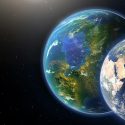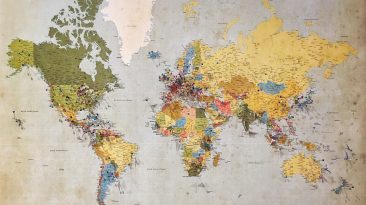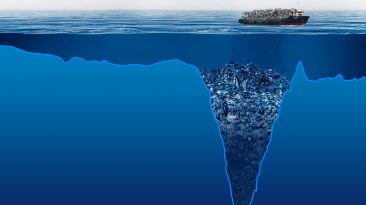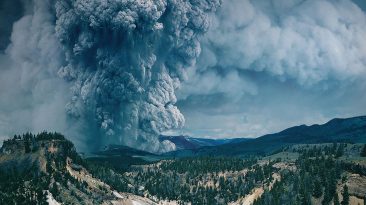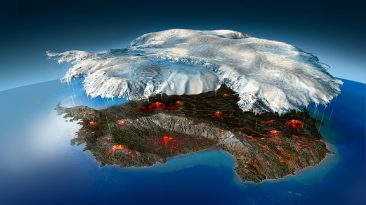Chaos overtakes the streets, and the news spreads like wildfire. Sea levels have suddenly risen 500 meters, and giant waves are headed your way. Where could you hide to survive this catastrophe? Would your city be destroyed? And what would it take to trigger a disaster of such epic proportions?
There’s no shortage of data on rising sea levels flooding the internet. Global warming has been progressively melting our ice sheets and glaciers. Over the past 100 years, sea levels have increased by around 24 cm (9.5 in). But for all of the oceans to rise 500 m (1,640 ft), you’d need a lot more ice than our planet has to offer. Which leads to another big question. Just how much ice would it take to flood Earth?
Let’s be clear. Earth does have lots of ice. But even if all of it suddenly melted overnight, it would only cause a rise of 70 m (230 ft). This would send all coastal cities underwater, forcing over three billion people to leave their homes and head for higher ground. That would just be a soggy walk in the park compared to the disastrous aftermath if our planet had seven times more ice. And ALL of it suddenly melted.
Now you’d be looking at a towering half-kilometer rise in sea levels. And devastating is anything but an understatement. Would it be enough to submerge all of the land on Earth? Luckily, no. The average elevation of land above sea level is about 840 m (2,756 ft). So there would still be some ground left for you to move to.
That’s unless you wanted to move to Australia. That continent would now be almost 200 m (656 ft) underwater. Europe could face a similar fate, with many of its countries sitting at way below the 500 meter (1,640 ft) mark. Places like Denmark and the Netherlands would be completely underwater, while Spain and France might keep their highest peaks above the water.
The U.S. and Canada wouldn’t be ideal places for survival either. Most of North America would now be the ocean floor. Where could you find safety amidst the chaos? Try Africa. This continent usually sits at about 600 m (2,000 ft) above sea level. So some big patches of it would stand a chance to remain dry. If you want even better chances at survival, you’d go to Chile or Afghanistan.
These countries have some of highest elevations on the planet so they’d likely suffer the least. Your absolute best bet at a better post-apocalyptic life? Look to China. Not only does China have higher elevations, it would also become the largest and most powerful nation on Earth. But you might be short on time to get there.
Billions of people would perish as coastal floods swallow entire cities and countries. Even if the few survivors somehow managed to reach higher ground, the disaster wouldn’t end there. Most farmland across the globe would be destroyed. It would be either submerged or contaminated by saltwater, making it impossible to grow food.
The remaining land would belong to mountain peaks, where the soil would likely be infertile. There wouldn’t be too many trees for you to build a house or start a fire. And you WOULD need four walls to protect you from bad weather, since It would be out of whack. That’s because the diluted ocean water would cause some ocean currents to stop.
With just the Gulf Stream out of the global climate equation, temperatures would plummet and maybe even trigger a mini ice age. You’d barely find any food to eat. Almost all the land animals would drown. And fish? Well, marine life wouldn’t be so lucky either. They are used to living in a higher salt concentration. So when the glaciers melt and dilute the saltwater with fresh water, all the fish would bloat and die.
Scary stuff, but what about you? Your own water reservoirs would be mostly wiped out. That’s because the ocean water would infiltrate groundwater reserves and pollute nearby fresh water, turning drinking water undrinkable. Put on your thinking cap because you’d have to find some clever ways to recycle water to drink.
And with that, the big blue sphere we call home would truly become almost exclusively blue and barely our home at all. So maybe you shouldn’t play with ice. Or better yet, you could make sure none of this ever happens by trying to refreeze the Arctic.
Sources
- “Climate Change: Global Sea Level”. Rebecca Lindsey. 2020. climate.gov.
- “Sea Level | NASA Global Climate Change”. 2021. climate.nasa.gov.
- “Why Saltwater Fish Cannot Live In Freshwater And Vice Versa”. 2022. divescotty.com.
- “Sea-Level Rise From Climate Change Could Exceed The High-End Projections, Scientists Warn”. Jeff Berardelli. 2020. cbsnews.com.
- “World Population Clock: 7.9 Billion People (2022) – Worldometer”. 2022. worldometers.info.



